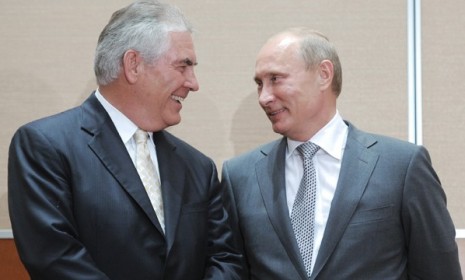Exxon snags a 'coveted' Russian oil prize: 5 consequences
The energy giant inks a potentially lucrative deal to explore the promising Russian Arctic for oil — and aggravates archrival BP in the process

A free daily email with the biggest news stories of the day – and the best features from TheWeek.com
You are now subscribed
Your newsletter sign-up was successful
On Tuesday, Exxon Mobil snagged a "coveted" Russian oil prize, cutting a deal with the state oil company, Rosneft, to explore an untapped portion of the Russian Arctic. And while many details of the partnership remain clouded in doubt and secrecy, the agreement is undoubtedly a big deal. Here, five possible consequences:
1. It will aggravate BP
British Petroleum had made a deal — seen as "a key milestone in the company's recovery from the Gulf of Mexico oil spill" — to develop the same Arctic territory with Rosneft, but it was blocked by BP's partners in another Russian venture. Now, "losing the deal to Exxon may be particularly painful at BP headquarters," says Guy Chazan in The Wall Street Journal. "The two companies have been at odds for months over the causes of BP's Deepwater Horizon disaster in the Gulf of Mexico last year." BP claims industrywide problems were to blame, while Exxon insists BP took unique risks.
The Week
Escape your echo chamber. Get the facts behind the news, plus analysis from multiple perspectives.

Sign up for The Week's Free Newsletters
From our morning news briefing to a weekly Good News Newsletter, get the best of The Week delivered directly to your inbox.
From our morning news briefing to a weekly Good News Newsletter, get the best of The Week delivered directly to your inbox.
2. And create new risks for Exxon
For the energy giant, "the deal means wading deeper into Russia's risky business environment," says Andrew E. Kramer in The New York Times. The company's future, and its future earnings, will increasingly rely on policies set in the Kremlin. Russians may be eager to attract Western partners now, says Jason Bush at the Financial Post, but they could always change their minds in the future.
3. The deal might be quite lucrative
Exxon calls this Russian territory "among the most promising and least explored offshore areas globally, with high potential for liquids and gas." The area is estimated to hold the equivalent of 110 billion barrels of oil — more than quadruple Exxon's proven reserves around the world.
A free daily email with the biggest news stories of the day – and the best features from TheWeek.com
4. It could help Putin
Should the Russian prime minister decide to try and return to the presidency, "Putin can now show off the deal as a success," say Darya Korsunskaya and Braden Reddall at Reuters. The failed deal with BP was seen as an embarrassment for him, so the Exxon agreement is a big political victory.
5. And it allows Russia to drill in America
Under the deal, Rosneft has the option of investing in drilling in the Gulf of Mexico and Texas. "Those operations could include two of the industry’s most contentious oil extraction methods — drilling for oil in the deep waters of the Gulf of Mexico and using the so-called hydraulic fracturing, or fracking, technique on land," says Kramer. "The Russians want to learn about both types of drilling for use at home."
-
 5 blacked out cartoons about the Epstein file redactions
5 blacked out cartoons about the Epstein file redactionsCartoons Artists take on hidden identities, a censored presidential seal, and more
-
 How Democrats are turning DOJ lemons into partisan lemonade
How Democrats are turning DOJ lemons into partisan lemonadeTODAY’S BIG QUESTION As the Trump administration continues to try — and fail — at indicting its political enemies, Democratic lawmakers have begun seizing the moment for themselves
-
 ICE’s new targets post-Minnesota retreat
ICE’s new targets post-Minnesota retreatIn the Spotlight Several cities are reportedly on ICE’s list for immigration crackdowns